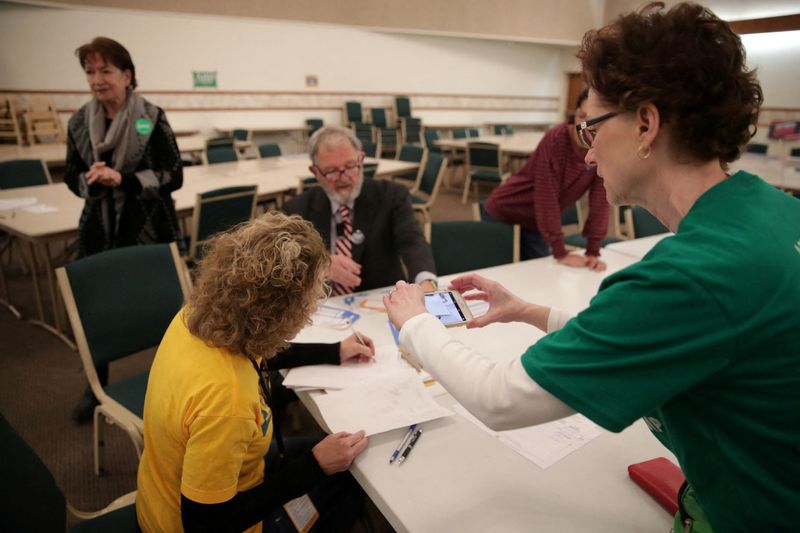By Andrea Shalal
WASHINGTON (Reuters) -Stripped by President Joe Biden of their special status as the state to hold the first nominating contest of the U.S. presidential election, Iowa Democrats are struggling to redefine their national relevance.
Rather than caucusing on Monday night like their Republican rivals, Democrats are voting by mail with results to be announced in March, having had to yield to Biden's wish to reward more diverse South Carolina with No. 1 status on Feb. 3.
The shift reflects Iowa's waning importance to the national Democratic Party.
Iowa's 3.2 million people command six electoral votes, a powerful agricultural lobby represents the state's corn and other farm interests in Washington and the state has nearly 670,000 registered Democrats.
But Iowa is nearly 84% white, when defined as non-Hispanic or -Latino, much less diverse than the U.S. or Democratic Party as a whole. By comparison, South Carolina is 63.5% white.
After a botched 2020 caucus, and a fourth place finish by Biden, Iowa was deemed by the Democratic National Committee as no longer a good predictor of national Democratic elections.
The state's shift has been swift.
Iowans twice supported the election of Democratic President Barack Obama and sided with Democrats in five of six presidential elections from 1992 through 2012. Since then, it has embraced Donald Trump and his fellow Republicans.
The shift has happened even as registered Democrats' share of the voter pool has not changed significantly.
Longtime Democratic Senator Tom Harkin retired in 2014, replaced by Republican Joni Ernst. Iowa had 31 counties flip to Trump in 2016 - the most of any state - after helping to elect Obama.
Now only one Democrat holds a national office statewide, nearly twice as many Republicans as Democrats serve in the state House and Senate, and a Republican governor, Kim Reynolds, will serve until 2027.
"I wouldn't necessarily say rock bottom, but it's sad to be a Democrat in the state," said Barbara Trish, a professor of political science at Grinnell College in Grinnell, Iowa. "But that also means that there's nowhere to go but up."
LOOKING BEYOND THE PRESIDENTIAL RACE
National Democratic Party insiders - many of whom knocked on doors in Iowa early in their careers - say there are no immediate plans to win the state in the Nov. 5 presidential contest, saddening local party leaders.
Al Womble, head of the state party's Black caucus, said Democrats should think about more than the presidential ballot.
"When you lose control of state governments, that's when you start to lose power and influence in the country as a whole," he said. "We have a governor now who has rejected federal money for school lunches and other things just to prove a point."
Iowa party officials are trying to expand support at the county and local levels, said Iowa Democratic Party chair Rita Hart, a former state senator.
"It means reaching out to our friends and neighbors, through text messaging, phone calls, through knocking on doors, through the radio, through advertisements, town halls - all those things," she said.
Mike Draper, owner and founder of RAYGUN, a $10 million T-shirt retailer based in Des Moines, said it was short-sighted for national Democrats to abandon Iowa, especially given Republican plans are unpopular, like cuts to school funding, a $7.25 minimum wage not increased since 2009, and curbs on reproductive rights.
"Iowa should be more winnable mathematically," he said. "There should be some sort of a game plan for bringing Iowa messaging back. There could be something in Iowa that helps you do better in rural Pennsylvania as well."
Asked about complaints the national party is abandoning Iowa, national party chair Jaime Harrison detailed the Democrats' overall strategy, including elevating South Carolina and Michigan in the primary calendar, and making sure that regions of the country were well-represented.

"So geographically, all of the country is still represented in our early state windows. We just decided to move around some of the players to change up some of that to make sure that even more voices were heard, and that the diversity of this great nation was showcased."
Read Reuters' full coverage of the US election here: